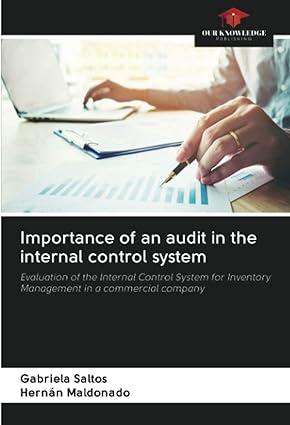Question
In the context of modern accounting auditing, explore the intricate role of auditors in assessing the financial health and integrity of a large publicly traded
In the context of modern accounting auditing, explore the intricate role of auditors in assessing the financial health and integrity of a large publicly traded corporation. Delve into the various stages and methodologies involved in conducting a thorough financial audit, emphasizing the importance of independence, professional skepticism, and adherence to auditing standards.
Begin by outlining the primary objectives of a financial audit and the critical role it plays in enhancing transparency, trust, and accountability in financial reporting.
Discuss the significance of auditor independence and the measures in place to ensure that auditors maintain an unbiased stance during the audit process. Highlight any recent regulatory developments or changes that impact auditor independence.
Explain the concept of professional skepticism in auditing and its vital role in the detection of financial misstatements or irregularities. Provide examples of situations where professional skepticism is especially crucial.
Describe the stages of a comprehensive financial audit, from initial planning and risk assessment to substantive testing and the issuance of audit opinions. Emphasize the importance of risk assessment and materiality determination in shaping the audit approach.
Explore the role of audit sampling techniques and statistical methods in gathering evidence and assessing the overall financial health of the corporation. Discuss how auditors decide on the appropriate sample size and selection methods.
Discuss the challenges and complexities associated with auditing specialized areas such as revenue recognition, inventory valuation, and fair value measurements. Explain the audit procedures commonly employed to address these challenges.
Highlight the role of technology and data analytics in modern auditing. Describe how auditors leverage technology to improve audit efficiency, detect anomalies, and assess the effectiveness of internal controls.
Consider the auditor's responsibility for identifying and reporting on internal control deficiencies and material weaknesses in a corporation's financial reporting. Discuss the implications of such findings on the overall audit opinion.
Explain the concept of 'going concern' in auditing and how auditors evaluate a corporation's ability to continue as a viable entity. Discuss the factors that may trigger concerns about a company's ability to continue its operations.
Lastly, touch on the ethical considerations and professional standards that auditors must uphold throughout the audit process. Discuss recent trends in auditing ethics and the consequences of ethical breaches for auditors and the firms they represent.
Incorporate relevant examples, industry best practices, and any recent developments in auditing standards or regulations to provide a comprehensive overview of the modern auditing process."
Step by Step Solution
There are 3 Steps involved in it
Step: 1

Get Instant Access to Expert-Tailored Solutions
See step-by-step solutions with expert insights and AI powered tools for academic success
Step: 2

Step: 3

Ace Your Homework with AI
Get the answers you need in no time with our AI-driven, step-by-step assistance
Get Started


